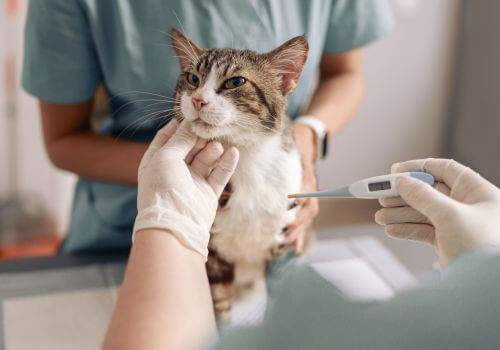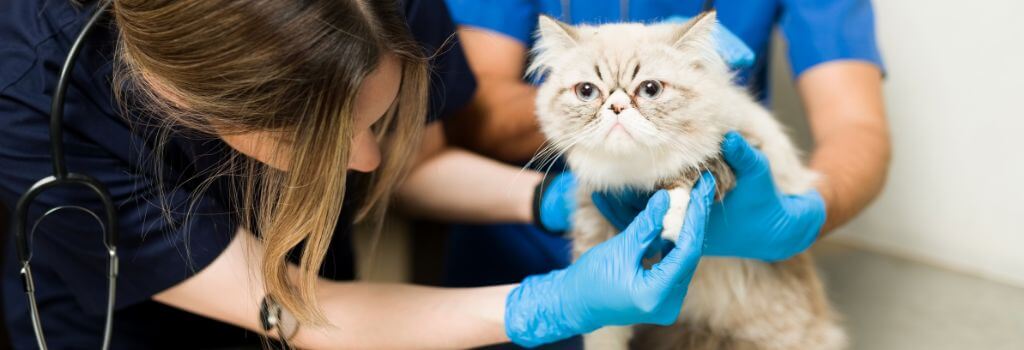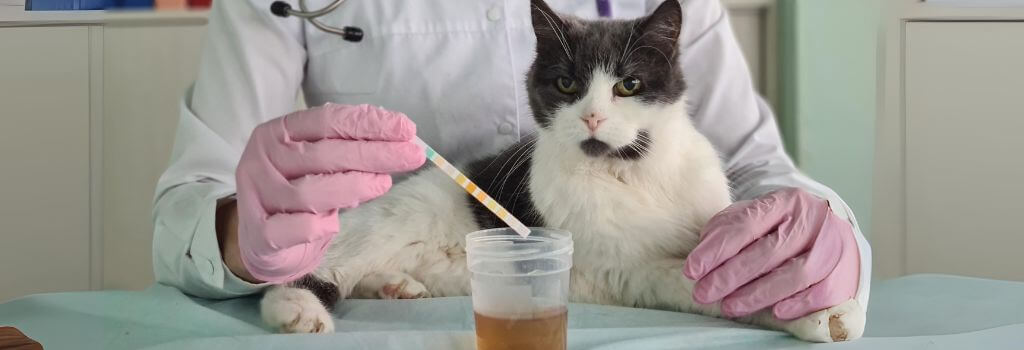As a pet owner, you want the best for your cat. But how do you know when they need emergency care? At Tuscan Ridge Animal Hospital, we understand that knowing for sure isn’t always easy. That’s why we offer comprehensive cat emergency care services and are here to help you determine what your feline friend needs. We are committed to providing the highest quality care for your beloved pet and will do everything we can to ensure the best outcome. In this article, we will discuss the symptoms of cat emergencies and help you better understand what to do if your feline friend ends up in such a situation.

What should I do if I think my cat is having a health emergency?
If you think your cat may be facing a health emergency, stay calm and assess the scene. Make sure there are no further threats to you or your pet. Keep your cat warm (unless you think they’re suffering from heatstroke). Contact your veterinarian for advice and further instructions or to let them know you are on your way. Transport your cat in a safe container, such as a strong cardboard box or a cat carrier, and get to the veterinary hospital as quickly as possible. In emergencies, time is crucial. Prompt action on your part can increase the odds of a favorable outcome.
What are some common signs and symptoms of feline health emergencies?
Knowing the signs and symptoms of feline health emergencies can help you take appropriate action and consult your veterinarian to ensure your cat gets the necessary care. Here are some common signs and symptoms of feline health emergencies:
- Swelling or hives: Swelling around the face or hives on the belly can signal an allergic reaction or possible anaphylaxis in cats, requiring urgent medical attention.
- Difficulty breathing, excessive coughing, or choking: These symptoms could indicate a respiratory issue or obstruction in the airway, both of which require immediate intervention.
- Obvious pain: A cat exhibiting signs of pain or distress may be experiencing pain from an injury, internal issue, or even a severe condition, like a urinary blockage.
- Uncontrollable bleeding: Significant bleeding that lasts longer than five minutes or is from an unidentified source warrants visiting an emergency veterinarian as it may indicate a deeper injury or internal trauma.
- Repeated vomiting: While occasional vomiting due to hairballs or digestion issues is normal, continuous vomiting can suggest a more severe underlying health issue.
- Sudden change in appetite or lethargy: A sudden change in eating behavior or energy levels can signify an undetected health problem that needs veterinary attention.
- Abnormal litter box behavior: Changes in litter box habits, especially for male cats, could indicate a potential urinary obstruction or infection, which can be life-threatening if left untreated.
- Blood in excrement: The presence of blood in a cat’s vomit, feces, or urine warrants an immediate consultation with a veterinarian to identify the cause and begin proper treatment.
- Ingestion of toxic substances: This may include common household items like certain types of human food, antifreeze, pest poison, poisonous plants, or other hazardous materials. Early detection and treatment improve the chances of successful recovery.
- Seizures, loss of balance, or sudden blindness: These symptoms could be indicative of neurological disorders or other serious health conditions that need immediate attention.
How do I tell if my cat’s situation is a true emergency?
If your cat shows any of the signs mentioned above, contact your veterinarian for advice and further instructions. They will provide personalized guidance on what steps you should take next. In many cases, they may recommend bringing your cat into the clinic for a physical examination. If they determine that your cat’s situation is an emergency, they will provide timely treatment and care so that your pet gets the help they need right away.

Why should I avoid self-diagnosing possibly serious health issues in my cat?
Self-diagnosing health issues in cats is a risky practice that can lead to inaccurate and delayed treatment, which could cause worsening symptoms, permanent disability, or even death. Professional diagnosis by a veterinarian is much more reliable and accurate. Veterinary diagnostic tests are essential in detecting and treating underlying health problems early, ensuring your cat’s well-being. Blood work, urinalysis, fecal testing, and parasite scans are crucial in identifying potential threats that may not be evident to the naked eye. Additionally, relying on the internet for self-diagnosing potentially life-threatening conditions can have severe consequences, including delaying vital treatment and exposure to dangerous online remedies.
Why is early detection and diagnosis of a cat in distress so important?
Early detection and diagnosis of a cat in distress is vital for various reasons. By recognizing the signs of illness or discomfort in your cat, you can take the necessary actions to ensure your pet’s long-term health and happiness. Here are some reasons emphasizing the importance of early detection and diagnosis:
- Evolutionary Tendencies: As cats have evolved to hide signs of illness and pain, they might not become apparent until their health is in grave danger. Detecting issues early on can help pet owners and veterinarians identify and treat a potential illness before it becomes a severe health risk.
- Preventing Larger Health Issues: Early diagnosis helps identify issues before they progress to chronic or severe conditions. For instance, noticeable changes in your cat’s eating or drinking habits could be an early sign of kidney disease or diabetes, both of which are more manageable if caught early.
- Stress-Related Health Problems: Cats are prone to emotional and physical health issues when experiencing high stress. They may develop physical illnesses or display problem behaviors. Addressing the source of stress early can help prevent further health issues.
- Pain Management: Cats, unfortunately, are experts at hiding their discomfort. Recognizing early signs of pain can help you understand your pet’s needs and provide appropriate care, thus ensuring better pain management.
- Reduced Treatment Costs: Early detection of health issues often leads to more cost-effective and efficient treatments. Delaying veterinary visits until there are obvious signs of an illness can result in more expensive and intensive treatments.
- Timely Veterinary Interventions: Screening techniques like focused cardiac ultrasounds can detect hidden heart disease in cats. This allows veterinarians to recommend more in-depth evaluations and interventions if needed, leading to improved health outcomes.
- Overall Quality of Life: Detecting distress, illness, or pain early can lead to timely treatments, decreasing the chance of chronic health issues and allowing your pet to enjoy a higher quality of life for a more extended period

The importance of seeking professional help and care for cats in distress
Seeking professional help and care for cats in distress is essential for the well-being of both the animal and the owner. Prompt intervention can prevent the development of serious physical and emotional issues, lead to quicker diagnosis and appropriate treatment, and improve the quality of life for your cat. As a pet owner, learning about the signs of distress in your feline companion and the steps you can take to alleviate your pet’s stress is of utmost importance.
At Tuscan Ridge Animal Hospital, we understand that it can be difficult to recognize any health issues in cats before they become serious. That’s why we are here to provide whatever type of care your cat needs when they need it most. We are dedicated to providing exceptional care for your pet and strive to stay on top of the latest treatments and technologies to ensure the best possible outcome for your cat. If you live in or near Wake Forest, NC, contact us today at (919) 556-1944 to set an appointment or if you have any questions about our cat emergency care services.
